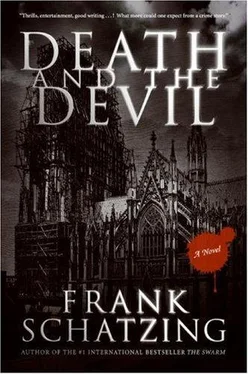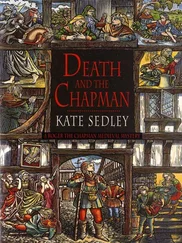Jaspar put his head on one side and squinted at Jacob. “You think this is the right moment to tell me all this?”
“Yes.”
“Hmmm.” He sat down facing Jacob and massaged the bridge of his nose. For a while all that could be heard was the drumming of the raindrops on the shutters.
“You’re right, I did see you as responsible. I was thinking, what right has he to live, when my servant had to die for his sake and Richmodis is God-knows-where, assuming she’s still alive. He should be feeling so guilty he wished the earth would open and swallow him up. And he has the cheek to ask whether I’m sure my suspicions are correct. He doesn’t deserve to live! How can God allow worthwhile people to suffer because of a piece of scum?”
He paused.
“But I had forgotten, just for a moment, that no life is worthless. What is worse, I was trying to wriggle out of the responsibility. It’s easier to condemn you than to admit I’m responsible for everything myself.”
Jaspar hesitated. Then he raised his head and looked Jacob in the eye. “I thank you for the lesson, Fox-cub. Will you continue to accept my help?”
Jacob looked at him and suddenly couldn’t repress a laugh.
“What now?” asked Jaspar indignantly.
“Nothing. It’s just that—you have an unusual expression when you apologize.”
“Unusual?”
“A bit like—”
“Like what?”
“There was this capon—”
“Impudent brat!” snorted Jaspar. “That’s what you get when for once in your life you admit a mistake.”
“Perhaps that’s why. Once in your life.”
Jaspar stared at him angrily. Then he had to laugh and for a while they both cackled away. It was nervous, overwrought, hysterical laughter, but it did them good all the same.
“Poor Rolof,” said Jaspar at last.
Jacob nodded.
“Well?” Jaspar’s brow furrowed like a plowed field. “I still think we should go onto the attack.”
“Attack who? How? When Richmodis—”
Jaspar leaned forward. “Richmodis has disappeared. We won’t help her by sitting around doing nothing, and certainly not Rolof. I also don’t think we can trust the man who abducted her. He intends to kill us all. But do you know what I think? I think we’re already making things a bit awkward for him.”
“How?” Jacob asked skeptically. “So far people on our side have done nothing but get killed.”
“True. But why then did he take Richmodis hostage instead of just killing her? In that case I’m convinced he’s telling the truth. She’s alive. What I mean is, why did he take her hostage?”
“Because it suited him. He can do as he likes with us.”
“No, goddammit! Because he had no choice! Don’t you see? All his attempts to get those who know about Gerhard’s murder out of the way have failed. Even if he were to kill Richmodis and the two of us, and Goddert into the bargain, he still wouldn’t know who else we’d told. He’s losing already. He’s lost track of the number of people who might be in the know. So he’s had to find a way of silencing us all at once; he’s had to go on the defensive. He’s made mistakes. Perhaps we can get him to make another.”
“We can’t.” Jacob waved the suggestion away. “We don’t know his name, nor where to find him.”
“We know he was a crusader.”
“Thousands were. Thousands and thousands.”
“Yes, I know. But this one is special. Probably a noble, a former knight or cleric, since he can write. Though I’m not too keen on his taste in ink. Studied in Paris.”
“How do you make that out?”
Jaspar pulled a face. “From Rolof, unfortunately. I told you, our murderer is starting to make mistakes. Over the years each university developed its own style of writing. The Bolognese, the English, the Parisian, to name but a few. The letters on Rolof ’s forehead are pure Paris school.”
“So what? You’re forgetting the patricians. Whatever we find out about him, they’re the ones we’re up against.”
“Or not. Why did they hire a murderer, eh? To do the work they don’t want to—or can’t—do themselves. Including murder, abduction, and torture. I can even imagine they might have given him a free hand to a certain extent.”
“Still,” objected Jacob, “what does it help, knowing about him?”
“Know your opponent, you know his plan.”
“And who was it said that?”
“Me. Well, no, the Roman emperor Julius Caesar. But it could have been me. Doesn’t matter anyway.”
Jacob sighed. “That’s all well and good, but I can’t think of a way to find out anything about him.”
“Of course you can’t. You’re the Fox while I’m a—what did you call me?”
“Capon.”
“A capon, yes, a capon who’s wide awake and doesn’t intend to get slaughtered. A capon who intends to win this battle. And he will.”
“I suspect the capon’s got it wrong there,” said Jacob.
“No, that’s not what he’s got.”
“What has he got then?”
“An idea!”
The old warehouse…
Kuno was sitting in his dining room, trying to work out which warehouse Daniel had been talking about. He may have been half drunk, but on that point he was presumably to be trusted. A woman was being held prisoner there. Who she was Kuno did not know. Much of what Daniel had thoughtlessly let slip was a mystery to him. The inference, however, was crystal clear. People were once more under threat because of the accursed alliance, the redhead they called the Fox and a woman, perhaps others.
The woman was in the old warehouse. But which warehouse?
He leaned back and feverishly racked his brains.
He knew quite a lot about the Overstolz’s properties. His parents had been frequent guests of Johann Overstolz. And of his mother, Blithildis, the old despot, as people called her behind her back, for she had come to dominate the Overstolz household more and more. There was something uncanny about the blind old woman. Years ago she had mistakenly been declared dead. For three days she had given no sign of life, then had woken up, helpless, tied to a chair. She, even more than old Gottschalk Overstolz, was the one who pulled the strings in the most powerful patrician family of Cologne, and Kuno knew that it was only hatred that kept her alive. Hatred of all who had harmed the house of Overstolz without having been made to pay for it.
Since the death of his father two years ago—long after his mother—Kuno had lived in the large family residence with his brothers, Bruno and Hermann, and their wives. It had been a short period of happiness before the fateful blow struck.
His brothers’ wives, Margarethe and Elizabeth, were now living with their relatives, out of fear of reprisals from the Cologne authorities. Bruno and Hermann were in hiding at the court of the count of Jülich, leaving Kuno alone in the family house.
He felt lonely. He suspected his initial enthusiasm for the alliance was a result of his loneliness. But then he remembered that he had always been alone. His father had not thought much of him; he felt his son was too soft and did not really understand him. His mother had died too early. He got on better with his brothers, but without there being any real warmth between them. His only genuine friends had been Gerhard Morart and his wife Guda, old friends of the family who, after the commission for the cathedral from Conrad von Hochstaden, had been welcome guests in the houses of all the great families. At some point or other Kuno had realized that Gerhard, probably without being aware of it, had supplanted his father and taken over his role. Kuno loved the old man, and suddenly strange rumors started to appear, the significance of which Kuno did not fully understand. Were they figments of a diseased imagination or did they correspond to a truth he refused to admit to himself? The rumors were spread by Daniel…
Читать дальше












